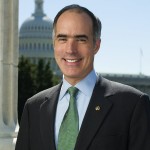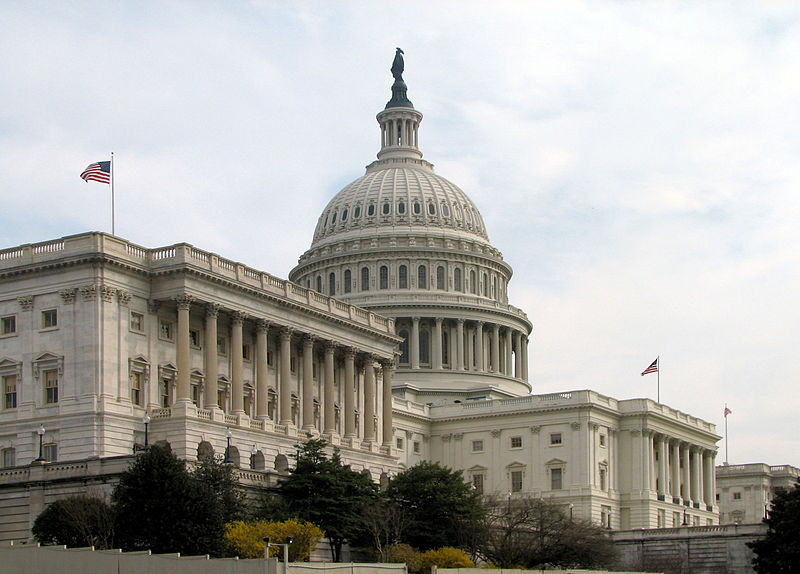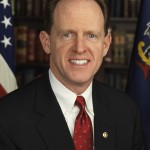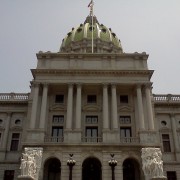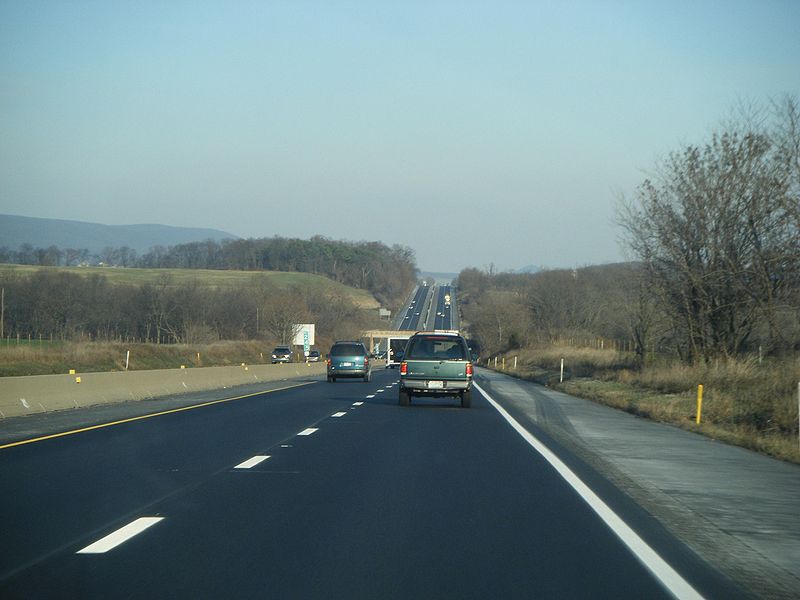Posts
Governor Tom Corbett on state revenue collections running behind projections
/in Ask the Governor, Media, News, Video /by PAMattersPA Clarifies Sales Tax Rules, Eyes Online Retailers
/in News /by PAMattersBusinesses are pouring over a new Tax Bulletin from the Pennsylvania Department of Revenue, which clarifies existing sales tax nexus law. The law requires businesses with a physical presence in Pennsylvania to collect and remit sales taxes on items sold online, by phone or by catalog. “Thousands of retailers and businesses that employ people throughout the state, and collect and remit 6% sales tax – 7% in Allegheny [County] and 8% in Philadelphia – felt that they were being treated unfairly,” explains Revenue Secretary Dan Meuser.
The bulletin informs remote sellers, which have nexus in Pennsylvania, that they have until February to become licensed to collect sales tax. Failure to do so could result in audits, liens or other enforcement measures.
It could have a broad application across online-only retailers that have not been collecting and remitting state sales taxes, according to Dan Hayward with the Pennsylvania Alliance for Main Street Fairness. The Pennsylvania Retailers’ Association joins Hayward in calling it a great first step toward equity and fairness. “Pennsylvania’s retailers, and the more than 600,000 jobs they have created, deserve fairness and a level playing field with their Internet competition,” says PRA President & CEO Brian Rider.
Testifying before the House Finance Committee in May, the Department of Revenue estimated that PA is missing out on $350-million dollars a year because online retailers aren’t collecting sales taxes.
But just because state sales tax isn’t collected on many online purchases, it doesn’t mean taxes aren’t due. Beginning in January the state will provide a line, on Pennsylvania personal income tax returns, which allows individuals to self-report their use tax. Use tax rates are identical to the sales tax; they’re due when consumers make taxable purchases for which no sales tax is collected.
Obama to Talk Taxes in PA
/in News /by PAMattersPresident Obama will make a Wednesday appearance at Scranton High School, where he will urge Congress to extend and expand the existing payroll tax cut. The legislation, dubbed the Middle Class Tax Cut Act, is actually sponsored by Senator Bob Casey (D-PA). Without Congressional action, the existing payroll tax break of 2% will expire at the end of the year. “Not extending the payroll tax cut would be raising taxes on middle income families,” Casey explained.
Casey’s plan would both extend it and expand it to 3.1%. “That kind of a cut would put $1,500 – as opposed to last year’s number of $1,000 – $1,500 into the pockets of the average family next year,” Casey said during a conference call with reporters.
For instance in Cameron County, where the median household income is $36,536, the savings from Casey’s proposed payroll tax cut would be $1,133. In Chester County, where the median household income is $81,380, the savings would be $2,523.
The bill would be funded through a surcharge on income that exceeds $1-million dollars, which is leading to likely Republican opposition. Democrats are expected to bring it up for a test vote as early as this week.
Toomey Discusses New “Super Committee” Post
/in News /by PAMatters
US Senator Pat Toomey (R-PA) was a “No” vote on the debt deal that passed Congress last week, but he will serve on the Joint Select Committee on Deficit Reduction. Senate Minority Leader Mitch McConnell (R-KY) tapped Toomey for the “super committee” job on Wednesday. Toomey tells reporters he’s honored to serve. “This is a very important moment in the history of our country. We’re facing a very serious challenge, and we need to address it very aggressively.”
The bipartisan, bicameral “super committee” was created by last week’s debt deal, and will be called upon to reduce the deficit by at least $1.5-trillion dollars over the next decade. They have until November 23rd. Automatic cuts would be triggered if Congress doesn’t approve the committee’s recommendations.
Toomey says the tax code is chock-full of opportunities for improvement, and he hopes the committee will take a close look. “The goals should be to broaden the base and lower the rates, so that we can create an environment that’s more conducive to economic growth,” Toomey explains. “That will also generate more revenue, a stronger economy always does.”
While he would like to see the committee put the US on the path toward a balanced budget, Toomey acknowledges that success will require bipartisan support. As reporters peppered him with questions on Wednesday’s conference call, Toomey cautioned that it’s probably not constructive to conduct committee discussions through the media.
Other Senators on the committee include: John Kyl (R-AZ), Rob Portman (R-OH), Patty Murray (D-WA), John Kerry (D-MA) and Max Baucus (D-MT). House members already named to the committee include: Fred Upton (R-MI), Dave Camp (R-MI) and Jeb Hensarling (R-TX). House Democrats have yet to appoint their members.
Transportation Funding Report Released
/2 Comments/in News /by PAMatters
The TFAC report includes funding recommendations, a litany of modernization ideas and a 10-year vision of strategic investment.
The five year funding plan, outlined in the final report, could generate an additional $2.5-billion dollars in annual transportation funding. The report indicates that the governor’s Transportation Funding Advisory Commission (TFAC) was directed not to consider hiking the gas tax, leasing the turnpike, or assumed federal aid.
With those ideas off-the-table, the ultimate funding recommendations focused on adjusting driver and vehicle fees for inflation, uncapping the wholesale tax that oil companies pay and increasing fines that get funneled into the Motor License Fund.
“It’s a very fair plan because it doesn’t focus all of the costs on one segment of the motoring public,” said Bob Latham, Executive Vice President of Associated PA Constructors, and one of 40-members on the Transportation Funding Advisory Commission. “What it does seek to do is to start down that path, and increase funding gradually over a period of five years. So you won’t see a major impact to highway users, whether they’re commercial users or personal motorists.”
The impact on the typical driver – assuming no speeding tickets or other infractions – would be about $36-additional dollars in year one. By year five, it could be up to $132 dollars. But, PennDOT has said those are conservative estimates, based on all of the additional oil company tax revenue being passed onto consumers. The report does point out that TFAC is “deeply aware” of the need to minimize the burden on taxpayers. A few pages later it reads, “TFAC believes it is Pennsylvania’s best combination of options for aligning revenue with funding needs.”
Nearly all of the major recommendations would require some sort of legislative action. “Who knows, after the governor looks at it, what it’s going to look like when it goes to the legislature. Then, who knows what it’s going to look like after they have a chance to look at it,” said Jim Runk, President of the PA Motor Truck Association, and another member of the 40-member panel.
Runk was a bit leery when he was first appointed to the commission, but the feeling quickly faded. “I think after the first hour or so I was pleasantly surprised that a group that large, and with so many different backgrounds, was able to come together and talk about the issues that are important to Pennsylvania.”
Transportation Commission’s Final Report to be Delivered to Governor
/in News /by PAMattersTwo weeks after the governor’s Transportation Funding Advisory Commission voted on its package of funding and modernization recommendations, the final report is about to be delivered to Governor Tom Corbett. Phased in over five years, the recommendations are designed to provide an annual $2.5-billion dollar shot in the arm for transportation funding in the Keystone State. Previous commissions have pegged Pennsylvania’s transportation funding crisis to be $3-billion dollars a year.
It’s important that Pennsylvania is taking its transportation woes into its own hands, according to Joshua Schank at the Washington DC-based Eno Transportation Foundation. Schank says states can’t rely on the federal Highway Trust Fund for help. “The primary reason is that it’s traditionally been funded through the federal gas tax, which is 18.4-cents per gallon and has not been increased since 1993.”
The Transportation Funding Advisory Commission never considered a hike in the state’s gas tax. Chairman and PennDOT Secretary Barry Schoch likens the gasoline tax to chasing one’s tail. “If you increase it, you know that fuel consumption is going to go down in the future, so you’d have to increase it substantially to make up for that difference,” Schoch said back in June.

The Transportation Funding Advisory Commission recommends indexing driver and vehicle fees to inflation.
One high-profile recommendation that will appear in the report is the removal of the state’s cap on the wholesale taxes paid by the oil companies. The Commission also recommends an increase in the vehicle and driver fees, which would index them to the rate of inflation. All together, the recommendations could result in PA drivers doling out an additional $132-dollars a year. However officials say those are conservative estimates, based on the entire impact of un-capping the Oil Franchise Tax being passed onto consumers. PennDOT spokesman Dennis Buterbaugh tells Radio PA that’s unlikely to happen.
Many in Harrisburg are anxiously awaiting Governor Tom Corbett’s reaction to the report. Corbett says tapping the 40-member commission was the first step in a “reasoned approach” to the transportation funding problem. “As I call it, ready, aim, fire; not ready, fire, aim,” Corbett said on the July edition of “Ask the Governor.” The report’s recommendations would require legislative action.
Welcome to PAMatters.com, a new source for news and commentary from Pennsylvania’s capital. In addition to video, audio and pictures from the stories and events that affect YOU, you’ll also get some behind-the-scenes analysis via blogs from our award-winning staff of journalists.




